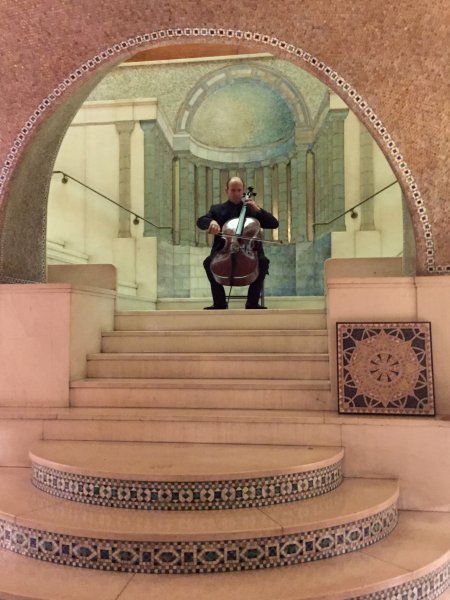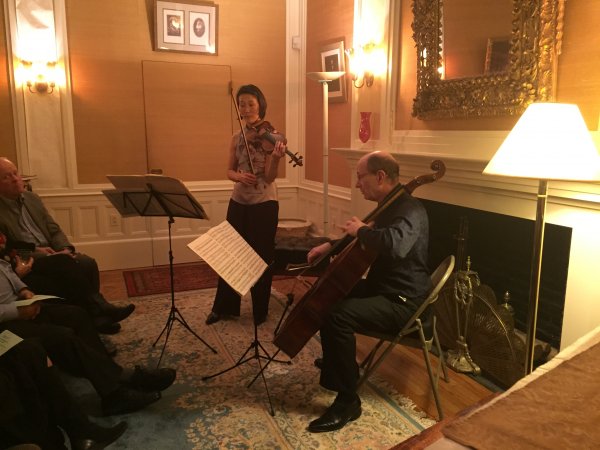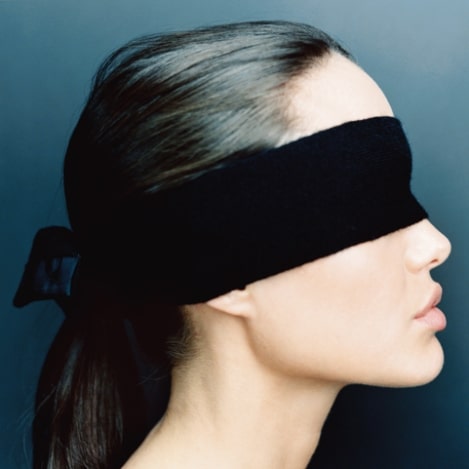Test, & short essay (musical point of reference)

____
Peter, the venue from last Friday...the room dimensions roughly: 20 feet high, 60 feet long, 40 feet wide. It's a complex venue with a foyer in the center and opening to adjacent room/corridors.
The music that was playing was traditional smooth Irish music, and only one musician/singer. I was simply giving my free time in helping.
It wasn't a setting like where the audience is sitting close together, just the contrary; people were sitting and standing all around a 360° circle. With the main area comprising a roughly 90° angle (one quarter). So it was impossible to have a good sound everywhere. The monitors I set @ around 5-foot height, so in line with the singer's voice. And those monitors were separated by only eight feet. I took pictures, but with my friend musician's own camera, so he has them and it's up to him to see if they are good enough (without using the flash) to share.
This was completely different than what you attended. A completely different style and music genre and room and audience setting.
Again, I was simply assisting a friend who asked me for assistance.
The main area in that room contains several windows, and the floor is all wood. It was a mix of painting exhibition, local products (various things), and live music accompaniment.
Two bars are in that main area, one for the drinks and the other for the food.
____
The scale of live music depends of so many things. The scale of people's home sound systems depends of so many things.
The scale of the human brain with its natural surroundings determine each one of us our own comfort zone.
Making the best of each life's circumstances, each venue, each music genre, each person's own characteristic, each moment in time and in space; is our challenge.
As we grow up we explore the fields of gained experience...the old and the new. We pick the music we feel best about, the music we listen to as a direct communion with our soul.
And each moment is the ultimate "in the now". We are free to plunge with full weight in it, or to run away fast or slow from it. :b
____
Human nature is very powerful; we are the ones creating the music, we are the ones listening to it, we are the ones choosing the venues and the instruments and the gear.
We judge easily what doesn't strike our chords comfortably. We are receptive. We are sensitive. We are who we are, us.
Nothing defines us but what we like. ...And a billion more things that are from our memories and dreams...
So, what do we use as a reference? It all depends of what we like.
____
Some systems must cost few dollars, and the sound quality from them must deliver something special, a feeling of warm emotion inside.
The artist contributes 90% of it, in my relaxed estimation. The rest is our own playground @ home when trying to replicate the live experience.
The artist performing live or in a studio recording doesn't feel the same, and he/she doesn't convey the same either, and the music recording is also different.
The music we truly love listening to and performed by the artists we love is our reference. It is as intimate as making love to someone we love with all our heart and soul.
Sharing is the way to happiness; respect, appreciation, balance, equilibrium on a physical and spiritual plane.
...Being in harmony in the now with the universe and everything inside and outside of it. That, could also be used as a reference. It's a way of speech of course, to show our appreciation in other's music journey that strikes our own chords of comfortably numb emotions, the ecstasy, the zone.
____
Some of my best live memories . . . are from the piano and sax and trumpet and cello and drum and guitar and organ and violin and flute and acoustic bass players. ...Like mental points of reference. ...In search of lost emotions...and new created ones.
Each day is a new reference, because each day we have evolved one more day. Our reference should improve tomorrow, and yesterday's reference is simply fading away into memory lane.










